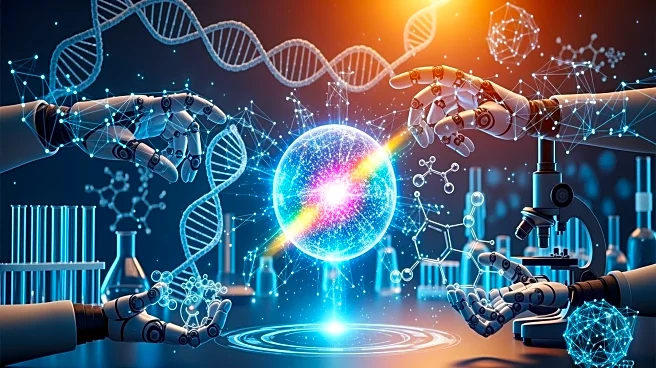What's Happening?
Bristol Myers Squibb (BMS) has announced the extension of its partnership with Insitro, a biotechnology company specializing in AI-driven drug discovery. This collaboration, initially established five
years ago, focuses on developing novel drugs targeting amyotrophic lateral sclerosis (ALS). The extended agreement includes a commitment of over $2 billion in potential discovery, development, regulatory, and commercial milestones, along with royalties on successful products. BMS will pay up to $20 million to extend the contract by one year, allowing further development using Insitro's ChemML technology, which leverages AI and machine learning for small-molecule discovery and optimization. This extension follows BMS's recent strategic moves to enhance its drug pipeline, including acquiring Orbital Therapeutics and partnering with Philochem.
Why It's Important?
The extension of the partnership between BMS and Insitro is significant for the pharmaceutical industry, particularly in the realm of neurodegenerative diseases like ALS. By utilizing AI-driven technology, the collaboration aims to accelerate drug discovery and development processes, potentially leading to more effective treatments. This move underscores the growing importance of artificial intelligence in biotechnology, offering a promising avenue for tackling complex diseases. The substantial financial commitment by BMS highlights the company's strategic focus on innovation and maintaining a competitive edge in the pharmaceutical market. Success in this partnership could lead to breakthroughs in ALS treatment, benefiting patients and advancing scientific understanding of the disease.
What's Next?
With the extended partnership, BMS and Insitro will continue to work on the identified ALS target using advanced AI technology. The next steps involve further research and development to optimize drug candidates for clinical trials. As the collaboration progresses, stakeholders in the pharmaceutical industry will be closely monitoring the outcomes, which could influence future investments in AI-driven drug discovery. Additionally, regulatory approvals and market entry strategies will be critical factors in determining the success of the developed treatments. The partnership's progress may also prompt other pharmaceutical companies to explore similar collaborations, potentially reshaping the landscape of drug development.
Beyond the Headlines
The partnership between BMS and Insitro highlights the ethical and cultural dimensions of integrating AI into healthcare. As AI technology becomes more prevalent in drug discovery, questions about data privacy, algorithmic transparency, and the role of human oversight in medical decisions arise. The collaboration also reflects a broader trend towards personalized medicine, where treatments are tailored to individual genetic profiles, potentially improving efficacy and reducing side effects. Long-term, this approach could lead to shifts in healthcare delivery, emphasizing precision medicine and patient-centered care.









